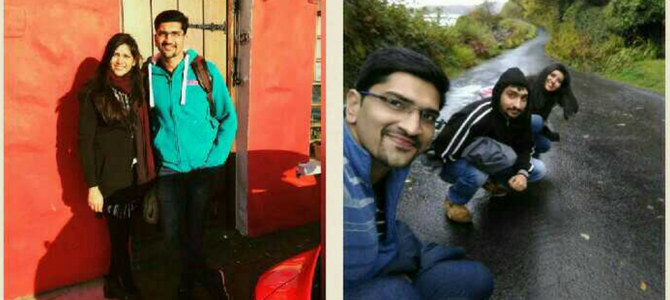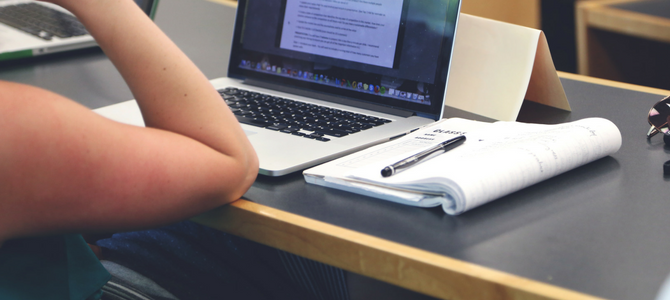As an international student, whether an undergraduate or postgraduate, you’ll have the chance to gain exposure to expertise and new perspectives in your chosen field of study. Couple this with a different culture, a brand new lifestyle, unique challenges and equally unique opportunities all in a lovely place like Ireland… it’s hard to imagine any negatives, but there can be challenges. Shubham Atal, our Indian and NUI Galway Ambassador fills us in on both sides…
 So what are these challenges and opportunities that I am talking about? Well, there can be many. And before I delve any further into this, I should give an idea of where I am coming from because I am probably not your regular ‘student’. For a postgraduate master’s student I am relatively mature, having finished my under graduate and post graduate in medicine a few years ago. I came here to shift streams in my career and move towards research. The master’s that I am pursuing gave me the right opportunity and allowed me to complete in one year, which was ideal for me.
So what are these challenges and opportunities that I am talking about? Well, there can be many. And before I delve any further into this, I should give an idea of where I am coming from because I am probably not your regular ‘student’. For a postgraduate master’s student I am relatively mature, having finished my under graduate and post graduate in medicine a few years ago. I came here to shift streams in my career and move towards research. The master’s that I am pursuing gave me the right opportunity and allowed me to complete in one year, which was ideal for me.
So first things first, the biggest challenge, which brings with it the inherent opportunity, is setting your goals and priorities, and choosing your course and field of study very carefully. If you do that right, half the battle is won because that’s the primary reason you are becoming an international student. Please pay attention to the value your course adds to your career, whether it’s budding or advanced. May be it provides you the skills or knowledge that you desire, maybe it’s a stepping stone to further studies or may be it really opens up an employment market for you. Analyse and choose wisely. Equally important is having some know-how about what your course is all about and how it is conducted. If you don’t develop interest in what you are studying, or cannot adjust to the style of teaching and the demands of the course, then it becomes a tough battle to fight in a foreign country in new life conditions. Try to network with potential employers and supervisors; don’t hesitate in approaching relevant people to discuss any pertinent issues or openings. The crux is to be prepared with the right attitude and approach to handle the challenges your studies throw up and maximise the opportunities that would lie beyond.

Perhaps as important or even more, is to be equipped for facing or rather embracing the ‘new life conditions’ that you would invariably get when you study abroad. When you are stepping out of your home country, you are basically moving into an exciting new life as young adults, expecting lots of freedom and adventures, discovering yourselves, looking for newer horizons both personally and professionally. All that is true, and very much enthralling, but it also means you are moving out of your comfort zones, whether you realise it or not. Even if you feel you have been just itching to get out of that zone and into the unknown, it’s very likely that at some point of time you will feel the pinch of not being in that comfort zone, the lack of the familiar surroundings, familiar people, and familiar environment. I am talking about the challenges of social, emotional, and cultural connect that many of us find ourselves faced with when we live abroad as students.
While most of the times we probably make the best of it as opportunities to experience those new things in life, making new friends, adopting new cultural habits, enriching ourselves with global perspective, it is also certain that some of us, and at some times we may all feel a bit lost, a bit unsure, a bit out of sorts. That is when we need to dig in and find the same strength which pushed us, encouraged us to come out in the first place! All of us may have different social and emotional needs, and also different levels of adaptability for physical life aspects like the food and weather (ah Ireland!). So we need to set ourselves up in the best possible way to cope with these domains of our life. Whether its food, weather, friends or culture, you must adapt; find ways to cater to these aspects. Look for things which help you – cooking / sharing food with others, getting involved in societies, recreational activities, taking trips, going out with locals, doing group activities with classmates, movie nights with friends – basically pick activities that help you be at ease with living in your environment.
Personally for me, the toughest part was to adjust with the feeling of being away from my family which includes my little daughter for months at a stretch. I felt I was prepared enough for the other stuff like daily life adjustments, and dealing with people and surroundings. What I needed and fortunately got here was a support system to understand and help me through the emotional upheavals that were bound to come, and also offer genuine friendship and companionship. I was looking for camaraderie and a feeling of belongingness. I wanted to experience the culture here, travel, and focus on what I am here to do. And I must say I am very lucky that I found just the right type of people for all of these things. I have a really small group of friends here who are wonderful; much younger to me but people I really connect with in different ways. There’s my housemate from India who makes daily life much easier at home, another young buddy who is like my partner in crime when it comes to having fun. Then there’s my classmate with whom I study, talk, share my coffees and lunches with; all this despite her being 11 years younger to me! The point I wanna drive home is that if you have those few right people around in your life when studying abroad, things become so much easier to manage, and you stay happy which is very important in life always !
So, dear friends if you are an international student or becoming one, do keep these small little things somewhere in your mind. Have your own ways, own people to wade through your year/s of living abroad as a student successfully and merrily,

